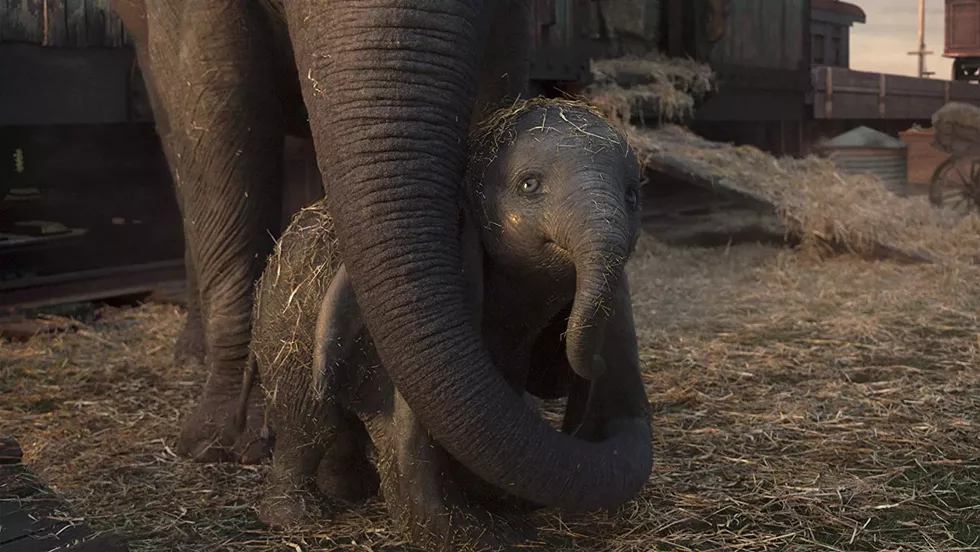Support the Free Press | Facts matter. Truth matters. Journalism matters
Salt Lake City Weekly has been Utah's source of independent news and in-depth journalism since 1984. Donate today to ensure the legacy continues.
Buzz Blog
Movie Review: Dumbo (2019)
Disney's latest remake doesn't understand the soul of its predecessor's appeal.

- Walt Disney Pictures
The principle problem with Disney’s ongoing self-cannibalization isn’t necessarily that they’re trying to make new versions of perfect films; it’s that they keep engaging in brand deposits that flounder to find a distinct reason to exist. Like The Tethered in Jordan Peele’s Us, they’re duplicates that lack a soul. And despite the desperate efforts by director Tim Burton and screenwriter Ehren Kruger in the new Dumbo to beef up the original’s thin narrative, they can’t make it anything but longer.
They set their story in 1919, as World War I veteran Holt Farrier (Colin Farrell), once a trick rider in the Medici Bros. Circus led by Max Medici (Danny DeVito) returns home having lost an arm in battle, and to his two children, Milly (Nico Parker, dead-ringer daughter of Thandie Newton) and Joe (Finley Hobbins) having lost their mother to the 1918 influenza pandemic; this Dumbo is nothing if not committed to its era. Medici’s recently-purchased new elephant gives birth to a baby with that certain unique feature, and one maternal freak-out by Mrs. Jumbo later, baby Dumbo is left alone—although he very quickly demonstrates his ability to fly.
That specific shift is one of the smarter decisions in the new Dumbo, and not just because it allows the special effects team to show off more scenes of their soaring CGI elephant. The attempt by Holt—given the assignment of wrangling the elephants, since his injury prevents him from riding—to turn Dumbo’s talents into an act at least provides some semblance of a narrative through-line. Farrell is mostly wasted, but DeVito has some fun with the penny-pinching Medici, and the production team works overtime to provide the circus with a kind of faded spectacle.
Yet this is also a story so packed with subplots and new characters that it feels like every five minutes, the creative team is trying out something else they hope will stick with an audience. From the struggles of Holt to reconnect with his still-grieving children (and the accompanying theoretical emotional link to Dumbo’s own motherlessness), to the maybe-it-could-be-a-romance between Holt and aerialist Colette (Eva Green), to the machinations of amusement park impresario V.A. Vandevere (an enjoyably scenery-chewing Michael Keaton) that offers the improbable sight of a Disney movie attempting to make you never want to go to an amusement park, Dumbo ’19 keeps raising the stakes, without actually finding a pulse.
And not to put too fine a point on it, but that’s because this version still doesn’t understand that the only real payoff here is the connection between Dumbo and his mom. There’s an attempt to recreate the original’s iconic “Baby Mine” scene—though whether the absence of the lovely “trunk swing” in this one is wise or misguided is up for debate—and at least a bit more content that makes their reunion the story’s ultimate goal. Yet all the other stuff just amounts to gaudy distraction. The more humans are added to the story, with all of their own problems and desires, the farther this Dumbo gets from the only reason it even exists—an adorable, sad, lonely baby elephant.
That baby elephant is pretty adorable, if not remotely as endearing and expressive as the hand-drawn original, so kids might still find themselves relating emotionally to his plight. And, of course, there are nudging references to the original, while dodging most of its problematic elements in favor of a moral that comes down on the side of freeing performing animals. It certainly can’t be said that the people involved here were so wedded to their source material that they were afraid to find anything new to say. But finding something new doesn’t mean finding something true—and while you may see an elephant fly in this Dumbo, you’re just not going to see a story that understands what really makes this character endure, beyond an original movie that doesn’t entirely deserve him.